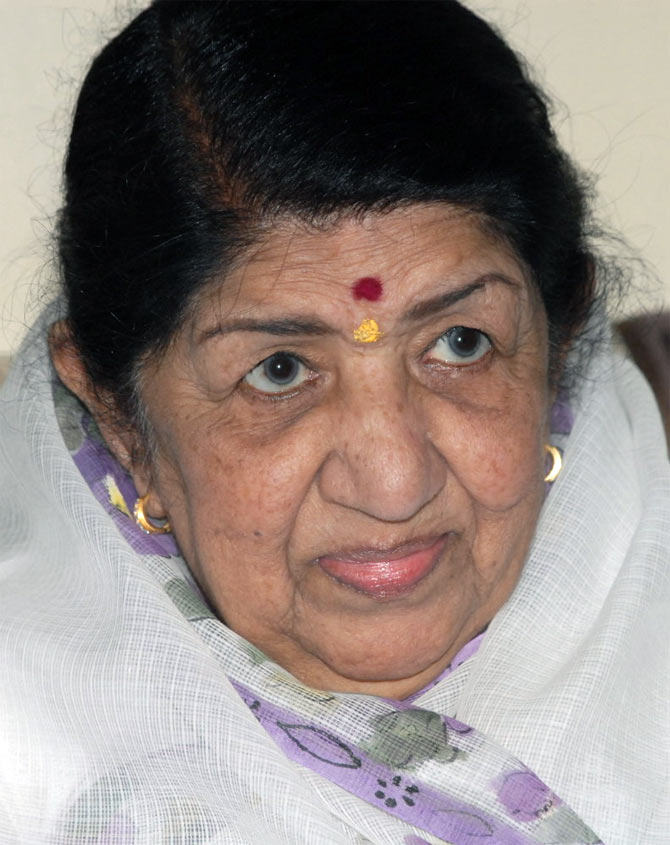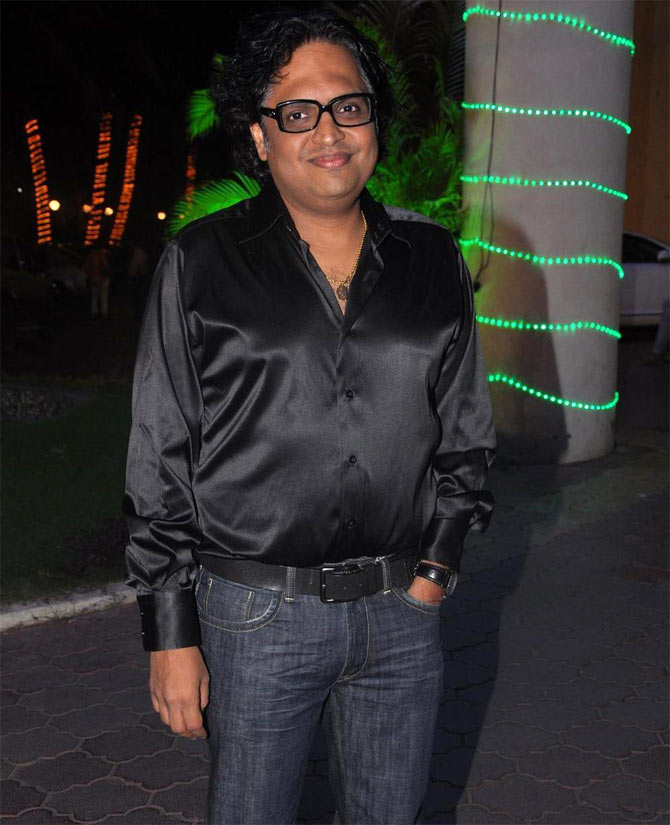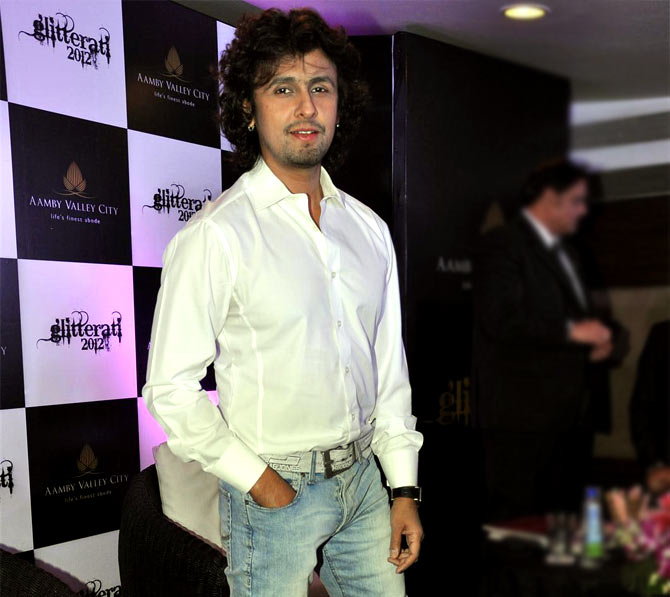 | « Back to article | Print this article |
'Manna Dey deserved a lot more than he got'
Legendary singer Manna Dey, who passed into the ages in the early morning of October 24, left behind a legacy of his songs and a legion of fans.
Lata Mangeshkar, who recorded close to 103 songs with the late singer -- including Pyar hua iqraar hua hai from Shree 420 and Yeh raat bhigi bhigi from Chori Chori -- remembers her colleague.
I feel really sad to see a colleague go.
We sang so many memorable melodies together. We also sang light, playful songs.
Mannada was a very versatile singer. He started his career as a singer much before I did.
I remember as children, we Mangeshkar siblings used to hear Mannada’s songs on the radio.
I sang with him for the first time in 1953. It was a song titled Ritu aaye ritu jaaye composed by Anilda (Anil Biswas).
Mannada was very accomplished in Hindustani classical music. He inherited his talent from his uncle K C Dey.
I had met K C Deysaab in Kolkata. At that time I didn't know Mannada was related to him. Mannada would proudly say he learnt music from his uncle.
We met socially and quite frequently. At that time, Mannada used to live alone. Baad mein hamara milna-julna kam ho gaya (later we met less often).
I think the last time we met was when we sang the songs in the Bengali version of V Shantaram’s Marathi film Amar Bhopali.
I think we were called to sing songs together when the tune required classical training, though we also did some fun songs like Aiso re papi bichhua for Salilda (Salil Chowdhary) and Chunri sambhal gori for Pancham (R D Burman).
Mannada was a very versatile singer. It was my pleasure to give him an award named after my father some years ago.
He deserved a lot more than he got. Though he was unwell for some time, his going away saddens me deeply, as he was the last of my singing colleagues.
Please click NEXT for more...
'He recorded an entire song in ONE TAKE at the age of 86'
Music composer Shameer Tandon, who was the last person to have worked with Dey, pays tribute to the singer.
I feel blessed to have had the opportunity to record with Manna Dey eight years ago for a film called Umar, when he was 86 years ‘young’. I called Dada and persuaded him to record for me.
He said he had given up singing for Bollywood. He was doing only concerts to run his kitchen. He wondered why an 86-year-old is being chased by a young composer to record for a young hero.
I had to explain to him that it’s a small festival film about three old men who are mistreated in the UK by their children.
I explained to him that in the UK and US since house-help is very expensive and unaffordable, parents are kept by beta-bahu to look after their children.
I told him that the song would be picturised on three 70-year-old men, played by Prem Chopra, Kadar Khan and Satish Kaushik.
Mannada then understood why I was insisting on him. He loved the melody.
I went to Bangalore where he lived and he invited me home for coffee. I briefed him on the song.
He said he would report at 9 am to the studio and he was there at 8:50.
He was an Englishman in the way he spoke and in his discipline. He went straight into the recording as the previous day he had already spent two hours learning the song from me.
Would you believe, at the age of 86, in ONE TAKE he recorded the entire song!
I realised later that the song was on a very high note since it was a little qawalli-ish, and at that age it’s difficult, if not impossible, for anyone to hit those high notes.
But Dada just delivered with such ease in one go.
The man refused to take money. He also instantly connected with me for my proximity to the Mangeshkar sisters. He had done homework on me, he told me later.
He had found out about me and he had heard some of my work and only then had agreed to lend his voice to my composition.
We had some snacks on a kayley ka patta (banana leaf) and he told me stories galore of yesteryears. This was when he was 86.
Mannada sportingly took up the challenge to hit the microphone in the studio and just rock the song. I hugged him. He said he will sing for his fans on stage till his last breath.
He invited me for some of his concerts, which I went and saw. I saw this ageless man entertain his audiences for three hours non-top.
Today he has passed away at the age of 94 and we should all celebrate and feel happy that he lived a complete life.
How many of us today may even cross 60? How many of our current lot of artists will perform and keep their voice in shape once they cross 50?
The man had no ego. He was a child. He learnt the song from me as if it was the first for him. No mobile ringing. No hurry to leave the studio. No unnecessary gossip.
He refused to take money but I insisted. He said, ‘Ashirwaad samajh ke rakhlo’ (take it as a blessing and keep it), but I just left the envelope in his car.
He was so positive. Not a word of negativity did he utter about today’s musicians. Veterans often speak ill of young people when they are past their prime.
'He lived like a lion'
Singer Sonu Nigam, who had worked with Manna Dey, recalled some fond memories associated with the veteran in a twitter post.
‘Old age took him away, but he lived like a Lion. Dignified, loving, large hearted in praising his colleagues and juniors. God bless his soul,’ Nigam wrote.
Recalling their association, he added: ‘I have been so lucky to have spent time, and even performed on stage with him..and heard is large hearted praises for me. His last film song was with me too, and Kavita ji, courtesy my friend composer Mr Shameer Tandon. Umar, 2006.’
Meanwhile, singer Kailash Kher tweeted: ‘Manna de the legend is no more, and his contribution to music n films is Unmatchable, RIP. transformed from physical to Divine, prayers.’
Music composer Aadesh Shrivastava also paid tribute to Dey and tweeted: ‘Hindi cinema ke mahaan classical singer,guru respected Manna Dey Saheb, Rest in peace.’


